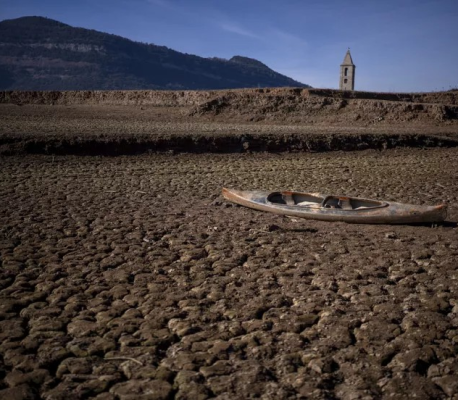Writing a post as long as this one requires four bottles of water for ChatGPT. The popular generative AI chatbot consumes 519 millilitres per every 100 words, according to a recent collaborative research by the Washington Post and the University of California.
As thousands of people enter prompts into ChatGPT and other similar AI chatbots, servers housed in massive data centres around the world run rapid calculations to deliver the best answer in just a matter of seconds. In this process, servers heat up rapidly and water systems cool the equipment to keep it functioning. At this pace, in only two years, the energy consumption by global centres could more than double, warns the International Energy Agency.
Living in a drought-prone area makes this alert incredibly tangible and relatable. 2024 has been a year marked by emergency measures and water restrictions in countries around the Mediterranean, such as Spain. The low water capacity of Spanish reservoirs has shaped our daily activities, caused severe crop losses and deepened food dependency. As we enter the third year of drought, the situation is not expected to improve with the current climate crisis.
In the water-stressed town of Talavera de la Reina (central Spain), Meta has decided to establish its largest data centre in Europe, which will need more than 600 million litres of drinking water. “[Tech Giants] search depopulated territories with a high unemployment rate (26% in Talavera), where the local population is weakened and no longer stands up”, explains Aurora Gómez, a local inhabitant who has launched the ecological association Tu Nube Seca Mi Río (Your Cloud Dries Up My River). “The eternal promise of job creation hides a bitter truth: data centres are highly automated and require highly specialised workers, who usually work remotely from cities. Value is extracted from the rural and jobs go to the urban”, adds Gómez.
Hola! This is Eva and I am a new contributor to Artificial Inequality. From now on, I will be reporting on the extractivist and colonial logic under which Tech Giants operate (Rone, 2021), its impact on the environment, and the precarious conditions of workers that run the ‘Potemkin AI’ (Sadowski, 2022). Blending journalism and activism, my mission is also to show you how places and people you have probably never heard of — like Talavera de la Reina and Aurora Gómez — are also connected to you and impacted by our daily actions.
Born in Barcelona, I have recently covered stories of childhood, migration, and modern slavery in Nepal by exposing the working and living conditions of kiln families and the carbon colonialism ingrained in this industry. Once again, I found out that the origin of the exploitation of resources and people in such a faraway country was closer to me than I ever thought.
In a moment of AI euphoria and techno-optimism, this blog also calls for urgent actions to develop more ethical technology that fosters equality and human rights.
All my posts are AI-free: no generative technology has been used to produce texts or images.
Header image: Emilio Morenatti.



Thank you for your article! We need to pay closer attention to the consequences of AI technology expansion, which are often overlooked in this area. I appreciate your use of the terms “AI euphoria” and “techno-optimism,” but in reality, we seem to be digging ourselves into a deeper hole rather than moving toward the equitable future that is often promised. As you mentioned, urgent action is needed!
Thanks so much, Limin!
I think you raise a very important point here: promises. Same old trick to play with vulnerable communities, but we need to hold them accountable for their actions.
Best,
Eva
Great post Eva. The Tu Nube Seca Mi Río website is a really interesting resource for learning more about the impact of data centres and physical internet infrastructure on communities and the environment. It’s refreshing to hear this perspective when so often data centres are discussed as a universal good by neoliberal politicians and corporate interests. It’s predicated on the assumption that growth is a social and economic necessity, regardless of the environmental consequences.
Data centres are also a contentious issue here in Ireland as they are a significant drain on energy – they already consume over a fifth of the country’s electricity and put even more challenges in the way of meeting national carbon emissions targets.
PS – The Rest of World site recently posted two interesting reports on the consequences of data centre development in communities in India and Malaysia:
https://restofworld.org/2024/microsoft-data-center-india-mekaguda-industrial-waste/
https://restofworld.org/2024/malaysia-data-center-jobs-environment/
Liam
Hi, Liam! I truly appreciate your comment and concern on this topic. I’ve also noticed a significant lack of transparency regarding data centres and their ecological impact. The greenwashing campaigns led by these tech companies are truly scandalous.
For example, the website of the data centre in west Dublin states: “Our community development work supports sustainability and digital skill-building for all ages. (…) We will contribute to a sustainable future, advance community prosperity and well-being, and operate responsibly as a good neighbor.”
https://local.microsoft.com/communities/emea/dublin/
It’s not just about buzzwords; they also position themselves as key players in building a greener future.
Thank you so much for also sharing information about the data centres in India and Malaysia. This is the first example I’ve seen regarding the impact on real estate prices —definitely something to keep an eye on.
Best,
Eva